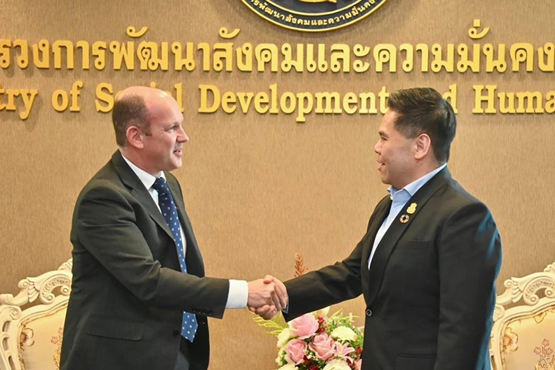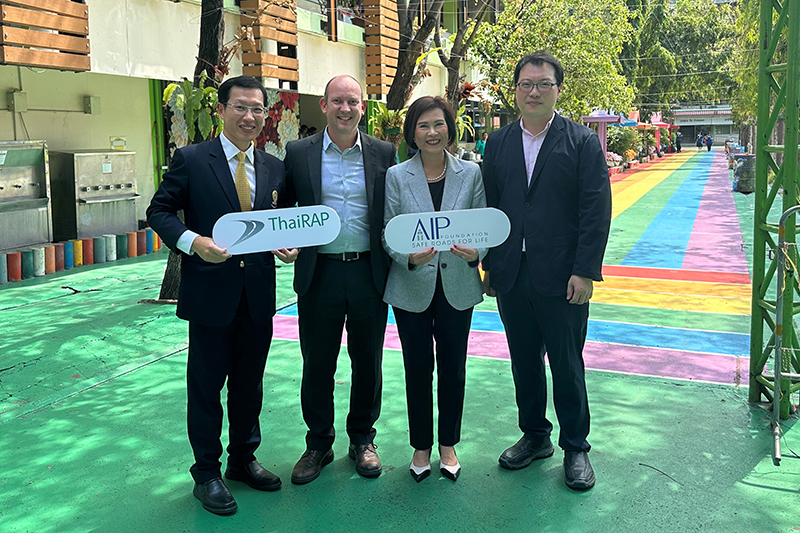Thailand’s new Parliamentary Committee on Road Safety focuses on protecting the vulnerable

The National Assembly of Thailand is setting its sights on making progress towards the country’s ambitious road safety targets, receiving input and advice from the FIA Foundation and its programme partners on strategies to save lives and prevent injuries.
Thailand’s National Master Plan on Road Safety has targets to reduce the rate of road traffic fatalities to 12/100,000 or less than 8,500 road deaths by 2027. This represents more than a 50% reduction on the current rate. According to the latest WHO Global Status Report on Road Safety, Thailand has over 18,000 annual road traffic fatalities, a rate of 25/100,000.
In order to step up and support efforts to meet the targets, the National Assembly has launched a new Parliamentary Committee on Road Safety.
The FIA Foundation represented by Deputy Director Avi Silverman gave input into a session led by Committee Chair, Pichet Chuamuangphan who is also Vice President of the Parliament. The focus was on how Thailand can reach its ambitious targets and deploy best practice approaches to road safety.
Among those also participating in the briefing were: Professor Kasem Choocharukul who leads the iRAP road assessments programme in Thailand; Dr. Wiwat Seetamanotch Coordinator of the WHO Thailand Country Cooperation Strategy on Road Safety; and Dr. Teeranee Techasrivichien, WHO Thailand.

There has been progress in Thailand in recent years particularly in work involving iRAP. The Department of Highways has been using iRAP to provide star rating for over 18,000 km of road network, and safety improvements are being recommended and implemented.
FIA Foundation Deputy Director Avi Silverman said: “Thailand has very ambitious national targets on road safety and the steps being taken could yield results if scaled-up. Taking approaches such as using iRAP to improve safety on Thailand’s major highways is effective. If this work was to be expanded across Thailand’s provinces, there could be even greater progress.”
A major concern in Thailand is motorcycle safety, with two-wheelers accounting for over 50% of the country’s fatalities. Committee Chair, Chuamuangphan was briefed on successful approaches to motorcycle safety and helmet programmes including work led by the AIP Foundation in the region. The Committee was presented with the FIA Foundation’s ‘Head First’ report detailing results from Vietnam’s motorcycle helmet campaign.
Both the FIA Foundation and WHO also briefed the Committee Chair on the 2025 Global Ministerial Conference on Road Safety where Thailand is expected to have strong participation.
Following the parliamentary briefing, the FIA Foundation was invited to a meeting with the Minister for Social Development Varawut Silpa-archa where there was a particular focus on road safety for young people, and the Star Rating for Schools programme.
iRAP has also been particularly active in Bangkok where work includes the Star Rating for Schools programme being coordinated in the city with the AIP Foundation. Collaborating with iRAP and the AIP Foundation, the Bangkok Metropolitan Authority has committed to improve safety on road infrastructure around 50 schools with highest risks of road traffic injury. Speed management will also be an important focus, with 30km/h zones introduced at the schools.
In a launch event on 29 February following the Parliamentary briefing, new safe infrastructure was unveiled at Na Laung School in Bangkok, which has over 3,600 pupils. The project was supported by Bridgestone, and implemented by the metropolitan authority together with IRAP and AIPF. Before the intervention, the school had a very low level of safety, but this has now been improved to a rating of over three stars in the iRAP assessment.



